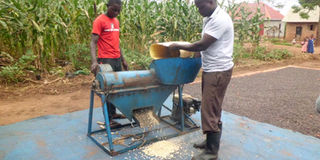Serunkuuma equips Nakaseke farmers with best practices

The portable maize huller which Serunkuuma uses at home. PHOTO BY LOMINDA AFEDRARU.
What you need to know:
- Serunkuuma’s passion for farming led him to train in better farming practices and he is now helping farmers in Nakasekes to improve, writes Lominda Afedraru
- Serunkuuma says since he left teaching, farming has changed his life because on average he is able to earn Shs1m per season from maize harvests and the services provided.
Stephen Serunkuuma, 27, of Lukese-Kasambwe village in Nakaseke district, is making strides in farming as a service provider.
Serunkuuma is not regretting venturing into farming as he has emerged successful in the various agricultural initiatives he provides the farming community in his village and other surroundings having attained several trainings courtsey of Sesakawa Global 2000 as a youth leader in his village.
Having dropped out of school after completing Senior Four in 2014, Serunkuuma took on a teaching job in a primary school where he was paid Shs90, 000 per month.
Additionally, he was already engaged in the family farm where his parents have been growing coffee and maize.
But the turning point was in 2017 when a team of agricultural experts from Sesakawa Global 2000 came to his village sensitising farmers to adopt improved agricultural technologies ranging from use of improved seed, best agronomy practices, agro processing of farm produce and use of better tools during harvesting and post-harvest process, he decided to go fully into farming and never to look back.
He started by managing the family four-acre coffee farm by using improved hurling and seed processing machinery to ensure the coffee taken to the market is of high quality.
Diversification
Since 2017, Serunkuuma has a four-acre land dedicated to maize growing. He hires the land from owners by paying Shs200, 000 per season. He also grows coffee on two acres of the family land. From the maize farm he estimates his harvest to about five tonnes every season although he is yet to harvest his coffee. Like other farmers, he battles pests and diseases as well as post-harvest loss, especially when the rains are prolonged.
Problem solver
Serunkuuma narrates that since acquiring farming skills from the Sesakawa team, he has been going to various villages in Nakaseke teaching farmers on the right agronomy practices for growing maize and coffee.
He also receives, on average, five farmers per day at his home seeking knowledge on best agronomy and technology utilisation to get better yields. He charges a minimum fee for his service.
For the case of maize he advises farmers to use hybrid maize varieties namely the longe series, which are high yielding for commercial reasons. He advises farmers to space the maize in 2cm by 2cm.
He advises farmers to apply fertiliser, especially NPK with 50kg serving per acre. He adds that after one month, put urea, in a measure of 50kg per acre, should be applied.
He has a quarter acre demonstration garden of maize, which he uses to teach the farmers from distant places. For the case of coffee, once the plant has grown ready to produce seed, it is important for farmers to prune the branches and ensure there are a maximum of three branches left.
This leads to better fruiting and for specific tree to produce enough seed, he says.
Other services he provides to farmers are post-harvest handling where he advises farmers to avoid using sticks for hitting the harvested maize but rather use machinery to remove seed from the maize cobs and shelling machine during flour processing.
He also encourages farmers to store the harvest maize, in maize cribs which are easily constructed on the side with wire mesh and proper roofing.
This will keep the maize safe from pest infestation for a longer period of time. He owns a shelling machine where he encourages farmers to come and utilise it and they are charged a service fee. This is used for shelling maize seed before it is taken to grinding machine to process maize flour.
Positive change
Serunkuuma says since he left teaching, farming has changed his life because on average he is able to earn Shs1m per season from maize harvests and the services provided.
He has managed to construct a semi-permanent residence using proceeds from his farming initiative. He wants to continue with farming for the rest of his life and invest in his own farming projects.
He owns his own computer machinery fully connected to internet where he is able to obtain more knowledge on upcoming technologies which he can use to teach other farmers as well as adopt them.
He intends to invest in purchase of hybrid pigs by the end of this year. He has been keeping the local breeds which are not profiting as well as the hybrids. He is in the process of erecting the structure.




